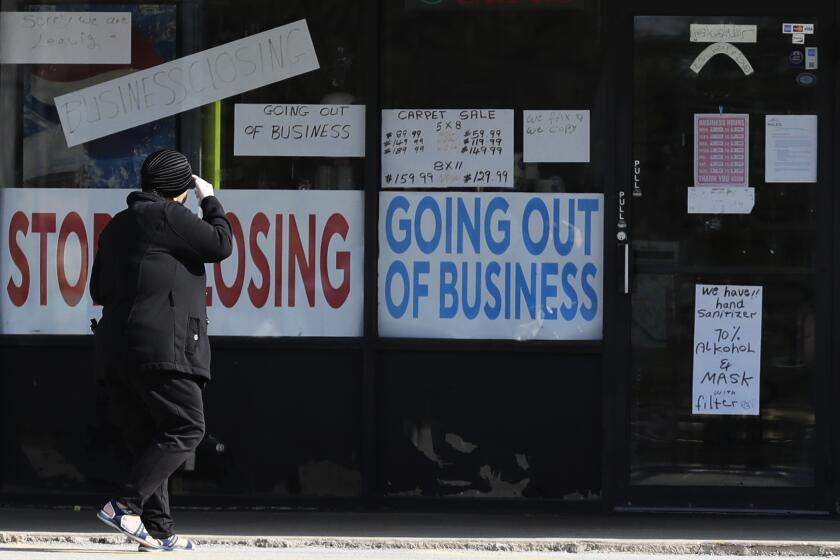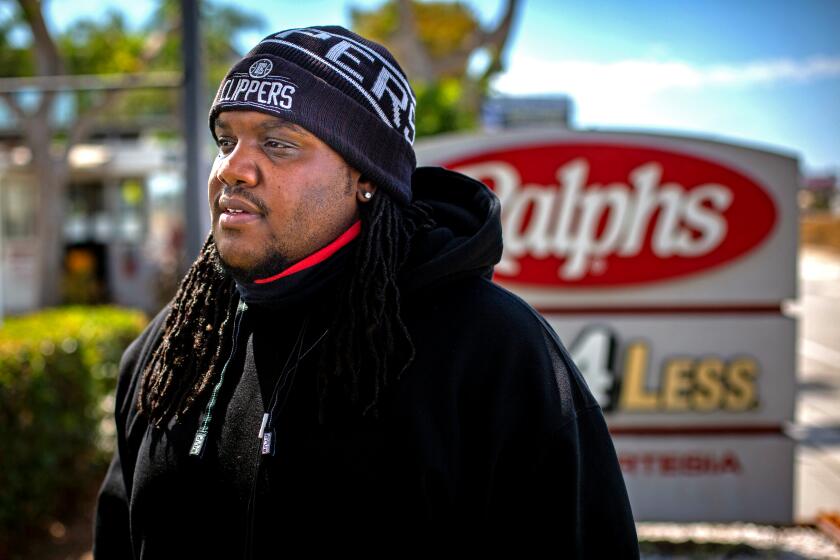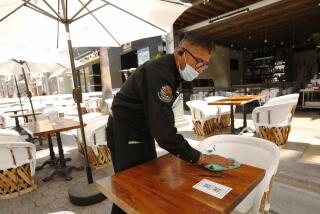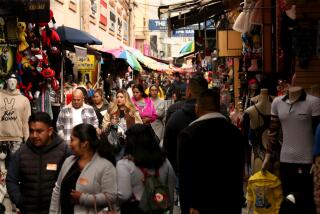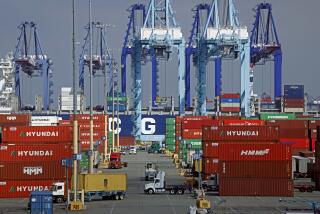Will California’s small businesses survive another COVID-19 surge without more help?
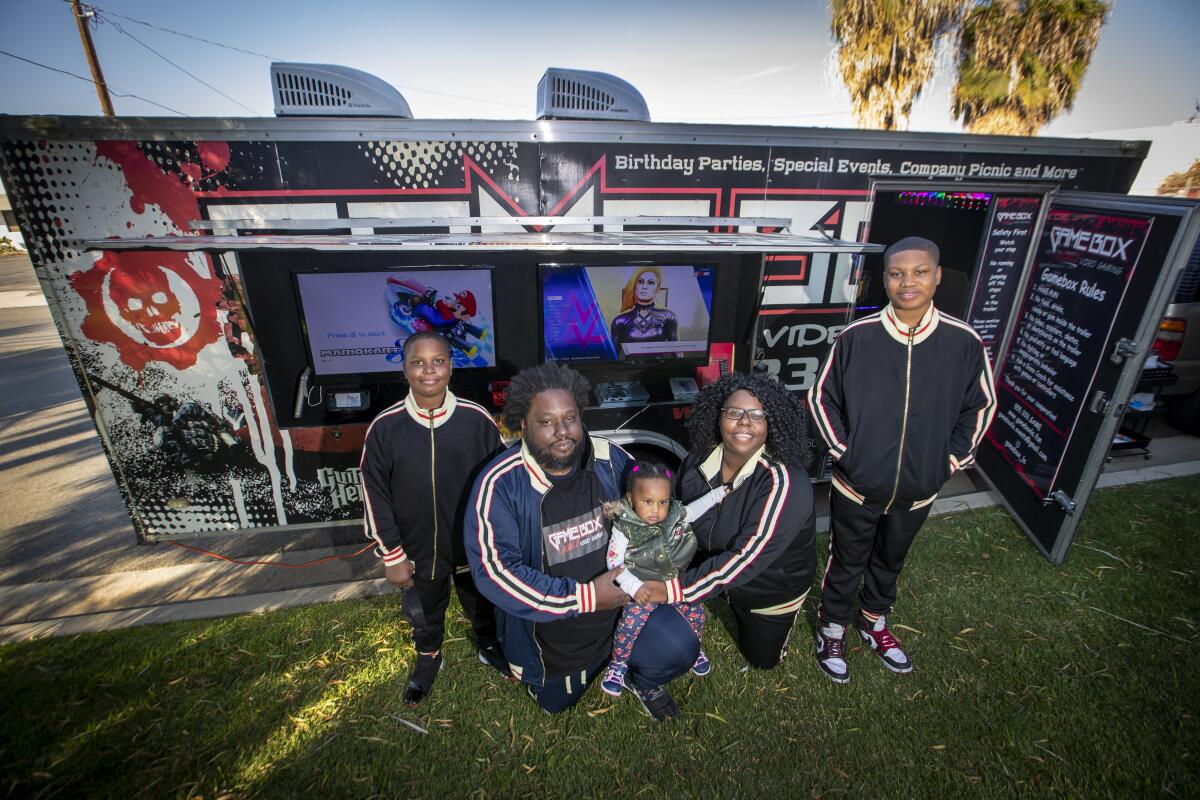
For 27 years, along an industrial strip by the 405 Freeway, Go Kart World has offered family fun with six racetracks and an arcade. But as news of the coronavirus spread in February, customers fled. And in March, health officials shut down the business.
“I was freaking out,” said Cynde Harris, co-owner of the Carson business with her husband, John. “Our season runs February through September. We were losing like $1.4 million. There’s no way to recover from that.”
The Harrises furloughed 35 workers, and over the next few months, they managed to snag two federal loans totaling $270,000. In October, a $30,000 grant from Los Angeles County came through. Go Kart World reopened this month.
But Harris is worried. “You can only take on so much debt,” she said. “It’s bitter medicine to be told, ‘You can borrow the money,’ when a government closure just drove a truck through your business.”
When the coronavirus began its death march through the economy last spring, Congress’ $2.2-trillion CARES Act buoyed California’s small businesses like Go Kart World with billions of dollars in loans and grants. But rescue efforts are now faltering as the pandemic reaches catastrophic new heights.
After months of partisan wrangling and the presidential election of Joe Biden, Congress remains in a stalemate over new stimulus funding for struggling entrepreneurs, unemployed workers and strapped state and local governments.
Without an influx of new federal aid, tens of thousands of California’s 5 million small enterprises face a bleak winter of government restrictions, dwindling customers and closures amid a slowing economic recovery. Many may not survive.
“The loans they got gave many businesses some moments of respite,” said John Kabateck, California director of the National Federation of Independent Business. “But they were Band-Aids on a very big wound. Now they’re very, very terrified.”
Despite a partial rebound over the summer, California’s small business revenue was down by 29.3% this month, compared with January, according to Opportunity Insights, an economic indicators tracker based at Harvard University. The number of the state’s small businesses that remain open has dropped by 28.8%.
With the possibility of a prolonged economic downturn, “many of these closures may be permanent because of the inability of owners to pay ongoing expenses,” said UC Santa Cruz economist Robert Fairlie, who tracks data for the National Bureau of Economic Research.
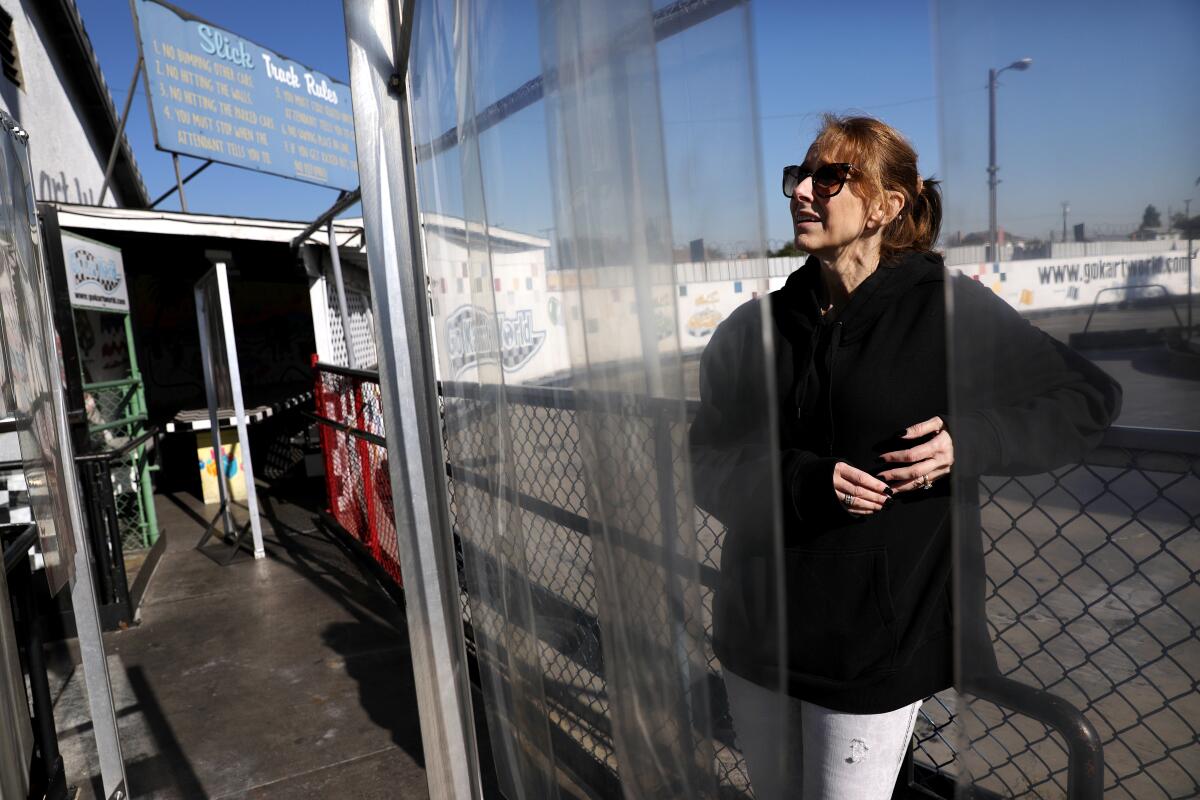
COVID-19 vaccines may be on the way, but it is unclear whether they will be widespread early enough to help many teetering businesses. In a national survey last month by the Small Business Majority, a network of 70,000 companies, more than a third of owners said their businesses would not survive past mid-January without additional funding. For Black-owned and Latino-owned enterprises, the portion was 41%.
Maricela Guerrero bought La Taverna Cubana, a money-losing Valley Village restaurant, three years ago and had begun to turn a profit when pandemic restrictions forced her to close in March. She laid off two of her four employees and reopened a week later for take-out and delivery only. Revenue is less than half of what it was, she said.
“We used to have lunchtime customers from the studios, but now they’re not making movies, so it is really slow,” said Guerrero, 48. “I don’t want to shut down. I’ve put my soul into this business.”
Thanks to the CARES Act, Guerrero got two federal loans, for $13,000 and $28,000. They helped with rent, supplies and payroll, but the money ran out in September.
A few weeks ago, she scored a $15,000 grant from the LA Regional COVID-19 Recovery Fund, a joint city-county program. But like many small eateries, La Taverna Cubana operates on a slim margin and Guerrero has racked up $40,000 in credit card debt.
Unless her restaurant can reopen fully, she says, she can’t survive past January without more help.
California’s economy perked up in October, as employers brought back tens of thousands of furloughed workers. But the state has regained less than half the jobs it lost in the spring’s catastrophic coronavirus downturn.
Full reopening is unlikely to happen soon. In the last week, California’s weekly coronavirus infections averaged 12,695 cases per day as of Friday, a 72.5% increase from two weeks ago. Hospitalizations have nearly doubled. Businesses in most of the state, including all of Southern California, are operating under the state’s most restrictive capacity and reopening rules.
Even if the state were to reopen soon, customers are likely to be wary of returning to malls, stadiums and other public places until transmission of the virus subsides.
Moreover, with the spring’s $1,200 federal stimulus checks now spent and the August expiration of a $600 weekly federal unemployment supplement, consumers have less money in their pockets to spend even if they do go out.
That’s a big worry for Serina Lim, 40, owner of Phnom Pich Jewelry International in Long Beach’s Cambodia Town district. Her store was shut in March and didn’t reopen until Oct. 1. She said sales have dropped to about half of what she saw this time last year.

“Jewelry isn’t on everyone’s list of necessities,” she said. And under county COVID-19 safety rules, the store can serve only one customer at a time.
Lim got two federal loans, for $50,000 and $27,500, as well as a $15,000 grant from the Los Angeles regional fund, but said her landlord refused to lower rent while her store was closed. And in late May, as protests erupted over police violence, her store suffered $80,000 in damage only partly covered by insurance, she said.
“We’ve depleted our savings trying to stay afloat,” Lim said. “But we’re still faced with the horrors of this pandemic. We need more aid to ride it out before the vaccine comes.”
To be sure, the pandemic’s effects are uneven. Restaurants, gyms, hair salons, movie theaters and other businesses involving close human contact are suffering far more than law practices, accountancy firms or technology companies whose workers can operate from home.
Stuart Waldman, president of the Valley Industry & Commerce Assn., which represents 400 San Fernando Valley companies, said “a lot of businesses, especially restaurants, have ceased to exist. It’s heartbreaking.”
Businesses fear they’ll be blamed for COVID-19’s spread. They’re fighting for measures to protect them from lawsuits over infections, hospitalizations and deaths.
Others are adapting, Waldman added, citing an actors’ studio that moved classes online. Small clothing shops and bookstores with loyal customers have brought back furloughed workers for online sales and curbside pickup. Santa Ana’s Blinking Owl Distillery began making hand sanitizer for hospitals. In Manhattan Beach, Kasih Co-op, a small company selling Indonesian-made pillows and cutting boards, pivoted to batik face coverings.
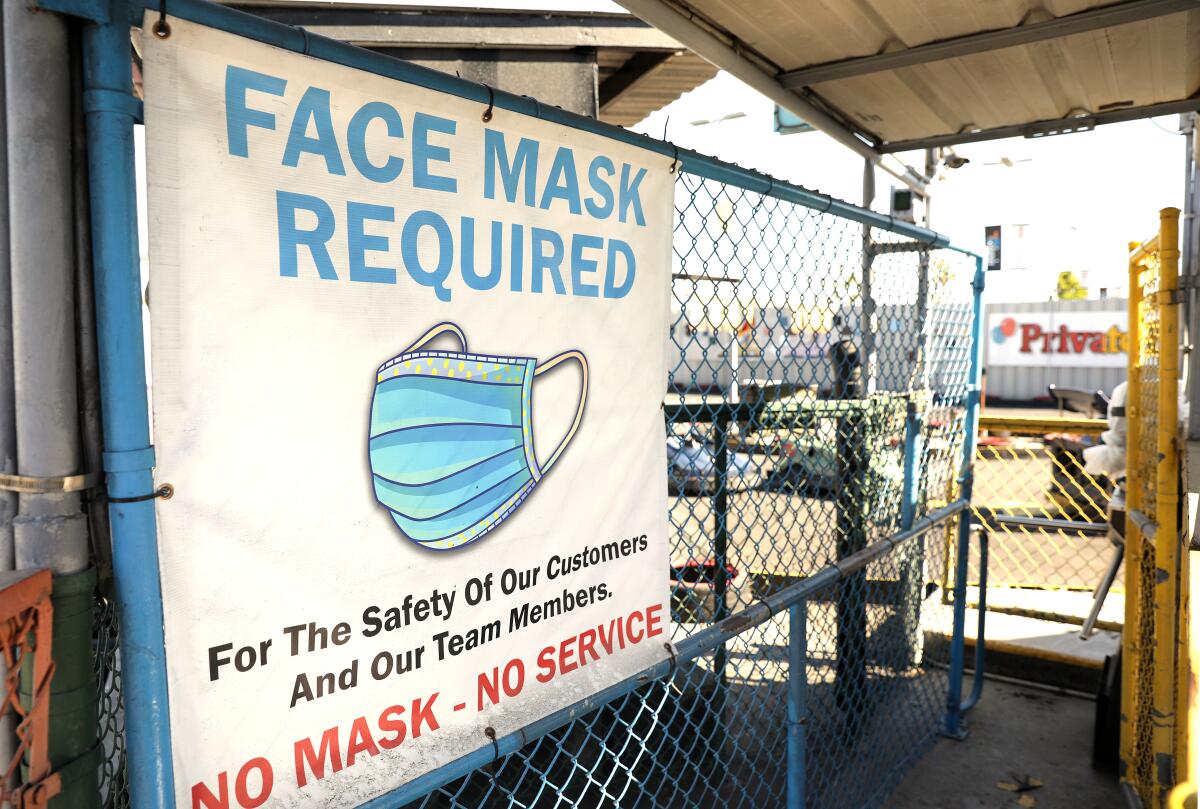
Survival often depends on landlords. Business operators “who own their own buildings are in a good position,” Waldman said. “And some landlords are giving rent discounts. But others force their tenants to even pay for parking spaces they can’t use.”
An October survey by the independent business federation found that sales were down by at least half for 1 in 5 small businesses in the U.S. as compared with before COVID-19. But 17% were doing better, with the rest somewhere in between.
Most small businesses that sought federal loans under two major CARES Act programs were able to get them, according to the federation. But the Paycheck Protection Program, which funneled $68.6 billion to 623,000 Golden State companies, stopped taking applications in August. The Economic Injury Disaster Loan program, which has loaned $34 billion to 550,000 California businesses, expires in December.
Many local programs are running out of money too. The $108-million LA Regional COVID-19 Recovery Fund, using city and county CARES Act money, stopped accepting applications last month.
A new $25-million state-funded loan program, the California Rebuilding Fund, launched last week for pandemic-affected businesses with 50 or fewer employees.
Of California’s 1.59 million business establishments with employees, 1.16 million have fewer than five people on payroll, according to the U.S. Bureau of Labor Statistics. Many, like Guerrero’s restaurant and Lim’s jewelry store, qualified for federal loans.
Many small businesses in Southern California are in jeopardy of closing permanently. Three owners explain how they made the hard choice to close.
But California has 3.4 million sole proprietors with no employees, and many have fallen through the cracks. Some couldn’t meet federal loan requirements or were flummoxed by paperwork. Others lacked a relationship with a bank to process a loan.
“The PPP required you to show you made a profit,” said Tunua Thrash-Ntuk, executive director of Los Angeles Local Initiatives Support Corp., a nonprofit distributing the regional funds. “Some people didn’t have that. And if you were a backup singer, a hairdresser or a street vendor and you didn’t have employees, you couldn’t get much money.”
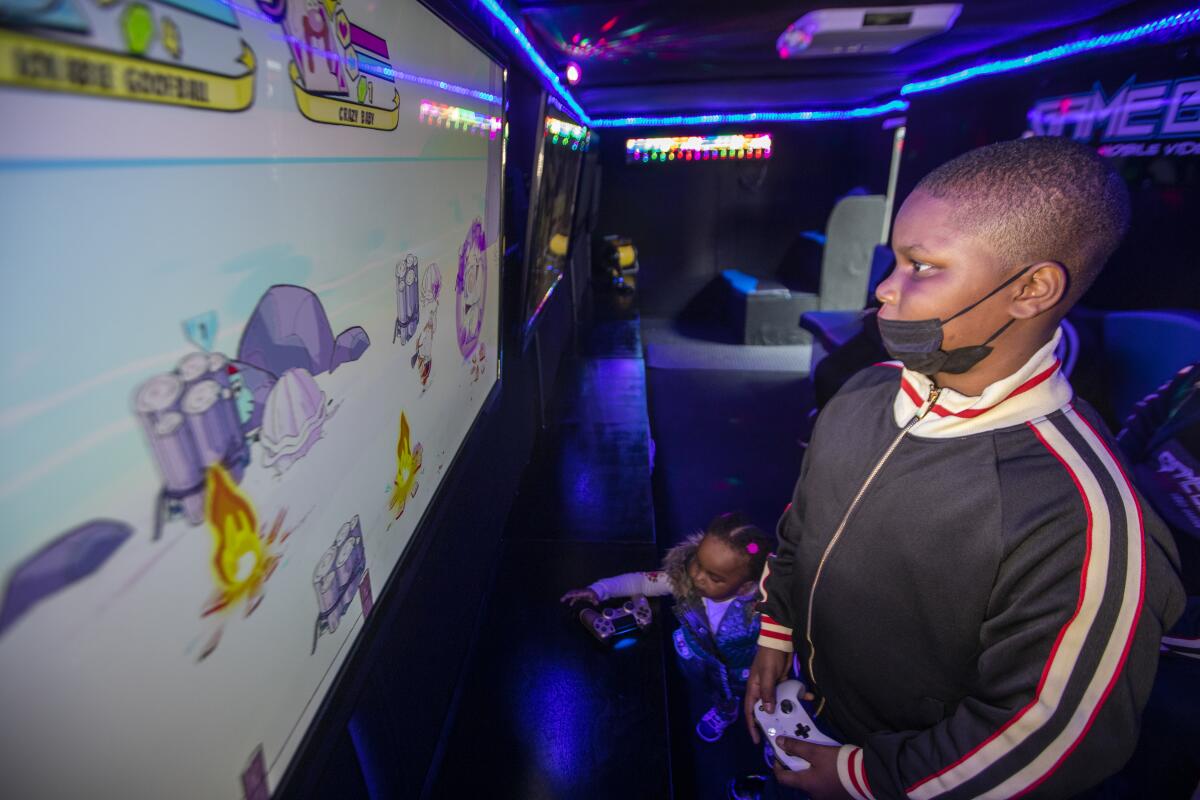
One clue to the vast need: 140,000 small businesses have applied for the Los Angeles grants since July but only about 7,000 will be funded. Of the $108 million, which must be spent this year, $31 million was allocated as of mid-November.
“We have to wait for entities to provide their information,” Thrash-Ntuk said. “We have to verify it. We are communicating with them in 15 different languages.”
Ebony Lynk’s business consists of a 20-foot video game trailer for parties. Based at her Paramount apartment, Gamebox Mobile Video Gaming and Entertainment has no employees, but Lynk’s husband, Romel Mallard, who was laid off from his trucking job last year, helps with the driving. Their sons, ages 13 and 10, volunteer as game coaches on weekends.
“After COVID hit in March, revenue went from $4,000 a month to zero,” she said. “We didn’t know what to do. We just kept praying.”
Lynk, 38, cut back on loan payments for the trailer but had to cover storage, phone and website maintenance. Then, in early July, as customers began trickling back, expenses rose as she began providing sanitizer and masks. The number of gamers inside the trailer was cut by half for social distancing.
In August, the federal Small Business Administration turned Lynk down for a disaster loan. But in October, she got a $5,000 grant from the Los Angeles regional fund. “I was so ecstatic, I screamed and ran around like a 5-year-old,” she said.
The grant, Lynk said, enabled her to increase loan payments for the trailer and now, with business back to normal, she has begun a program that offers gift certificates for fundraisers and free sessions for nonprofits. Among the first recipients: Sisters of Watts, a South Los Angeles community group.
If the new COVID-19 wave shuts down the game business, Lynk has a plan B. She has applied for a city license to sell home-prepared treats such as Rice Krispie squares and chocolate-covered pretzels. She’s been studying videos on how to make decorations such as balloon towers.
“I want my children to know if you work hard, you can make it happen,” Lynk said.
More to Read
Inside the business of entertainment
The Wide Shot brings you news, analysis and insights on everything from streaming wars to production — and what it all means for the future.
You may occasionally receive promotional content from the Los Angeles Times.

